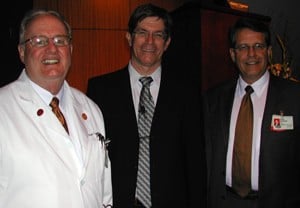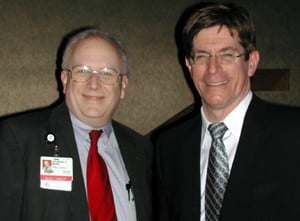Umbilical Cord Blood Transplants Increase Leukemia Survival
Feb. 25, 2010 | John Wagner, M.D., is trying to eliminate the “in” from “incurable,” and his quest has led him to a significant medical discovery — umbilical cord blood transplants can significantly increase the survival rate of leukemia patients. Wagner, a national expert in umbilical cord transplants, presented “Evolution of Umbilical Cord Blood Transplantation” Feb. 16 at the University of Arkansas for Medical Sciences (UAMS) as part of the Winthrop Rockefeller Distinguished Lectures. Wagner is scientific director of clinical research of the Blood and Marrow Transplantation Program and Stem Cell Institute at the University of Minnesota Medical School in Minneapolis, Minn. He also developed the International Cord Blood Transplant Registry. In 1990, Wagner was part of the medical team that made history by performing the first umbilical cord blood transplant for leukemia. Cord blood transplants are now used to treat several childhood blood diseases and cancers. More than 6,000 cord blood transplants have been performed around the world. Wagner has created one of the top umbilical cord blood research programs in the country at the University of Minnesota Medical School. His research focuses on umbilical cord blood transplants in children and adults with leukemia, lymphoma, and other blood disorders and cancers; multipotent adult stem cells; and an inherited anemia that leads to bone marrow failure known as Fanconi anemia. Gov. Mike Beebe signed into law in 2007 a unanimously approved measure to allow Arkansas to begin storing and researching potentially life-saving blood cells harvested from umbilical cords following the birth of healthy children. The law also authorized the creation of the Arkansas Commission for the Newborn Umbilical Cord Blood Initiative, an 11-member committee that is charged with educating pregnant mothers and the public about the benefits of donating umbilical cord blood. The Winthrop Rockefeller Distinguished Lectures were established in 1972 by friends of former Arkansas Gov. Winthrop Rockefeller. Rockefeller served as governor of Arkansas for two terms beginning in 1966. He died in 1973. The endowment that funds the lecture program allows five universities in the University of Arkansas system to offer free public lectures that communicate ideas to stimulate public discussion, intellectual debate and cultural advancement. Funding for Wagner’s appearance was provided by the Winthrop Rockefeller Foundation. |

